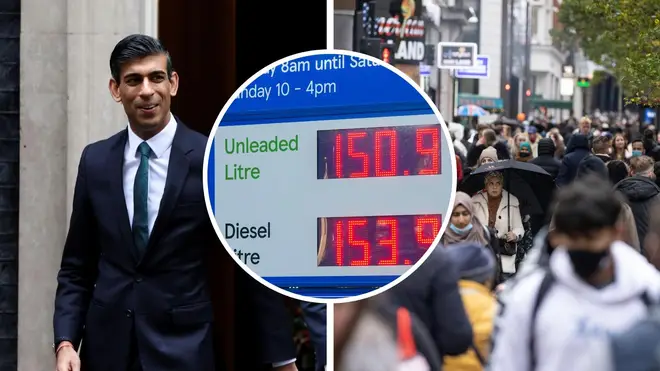
Iain Dale 7pm - 10pm
6 January 2022, 12:49 | Updated: 6 January 2022, 13:13

Chancellor Rishi Sunak has confirmed a planned rise in National Insurance will go ahead.
Contributions are due to rise by 1.25p in the pound from April.
The Cabinet is said to be in dispute about the tax rise because of growing pressures on household finances and the ongoing cost of living crisis driven by rising inflation and soaring energy prices with energy bills set to shoot up by as much as 50 per cent.
Mr Sunak said today the money is needed to fund the NHS and social care.
The Chancellor said today: “We are facing an unprecedented level of backlogs within the NHS.
“We thought as a government that it was unacceptable.
Read more: Nick Ferrari grills minister over calls to slash VAT to prevent fuel bill crisis
Read more: Thousands of Brits face cost of living 'disaster' - Labour hammers PM over soaring prices

Shapps asked whether tax rises should be ditched
“We wanted to invest to make sure there are more doctors, more nurses, more elective capacity in the NHS to make sure that doesn’t happen.”
Downing Street said the National Insurance hike will not be delayed, despite opposition from within the Cabinet.
No 10 says there are no plans to backtrack on the increase of 1.25 percentage points scheduled for April.
The Prime Minister's official spokesman said: "There are no plans to do that, no.

Minister asked why VAT isn't being cut on energy bills
"The Cabinet collectively agree with that approach and recognise the priority of the public in ensuring our NHS has the funding it needs to tackle the backlog, which has been exacerbated by Covid."
The Chancellor went on to say he is "listening" for ways the Treasury can help ease the cost of living rises, particularly when it comes to increasing energy prices.
Speaking at a vaccination centre in Haywards Heath, West Sussex, Mr Sunak said: "Of course I understand people's anxiety and concern about energy bills in particular - that's why we've put in place a series of ways to help people with energy bills.
"We announced half a billion pounds towards the end of last year to help millions of families - £100-150 to help them get through the winter.
"We've got something called the warm homes discount, which discounts energy bills by £140, we've got something called the warm homes for pensioners, we have got the cold weather payments as well, winter fuel discounts, hundreds of pounds worth of help.
"So there is support there for people but of course we're always listening, making sure the policy we've got will support people in the way we want it to, and that's what our track record over the last year or two shows."
Mr Sunak also cited the decision to increase the National Living Wage in the spring and reduce the Universal Credit taper rate as ways in which the Government is supporting low-income families.
Transport Secretary Grant Shapps earlier suggested the Government will stick by the rise to National Insurance despite Commons Leader Jacob Rees-Mogg calling for it to be scrapped.
Households are already seeing significant rises in the cost of living starting to place serious strain on their budgets, and that's before soaring energy prices and the National Insurance increase hit.
Covid-19 has hit global supply chains with a combination of demand and delays to shipping as factories across the world face lockdowns and worker absences.
This has led to prices rising, particularly for raw materials. Food prices have also risen as wages increase, including for HGV drivers due to recent shortages with thousands of drivers leaving the UK to return to their home countries in the EU.
Current predictions for energy bills are they they will go up 50%, causing some households to choose between heating and eating, it has been warned.
Some are calling for a cut in VAT or green levies on bills, while energy bosses are asking for a Government-backed support scheme to cushion the impact.
The Resolution Foundation recently said each household can expect outgoings to increase by £1,200 this year.
On Wednesday, data analysts at Kantar revealed grocery bills rose £15 on average in December and are likely to continue rising this year too.
Commons Leader Jacob Rees-Mogg sidestepped Labour questions today about whether he called for a hike in National Insurance to fund social care and the NHS to be scrapped at a Cabinet meeting.
At Business Questions, Mr Rees-Mogg said Labour could only call for cuts to taxes like VAT on fuel because the UK had left the "megalithic state" of the EU.
Shadow Commons leader Thangam Debbonaire said: "Perhaps he turns out to be more socialist than he has hitherto let on. Given that, according to the Financial Times, he is now asking his own Government to scrap the National Insurance tax rise, something we have been calling for since it was announced... I wonder - is he about to cross the floor? There is space."
He replied: "She thinks that I may be converted to her way of thinking. I think this is wishful thinking, it has to be said, because as her question went on and on it became clearer and clearer that not only is she now referring to taxpayers' money - a good Tory principle, we always call it taxpayers' money because we recognise there is no money from anywhere else - but also she is becoming Eurosceptic.
"She has become a staunch Brexiteer because the only way our socialist friends can advocate cutting VAT on fuel is by having left the European Union. If we were still in the megalithic state that she used to so campaign for... we would not be able to cut VAT on fuel."